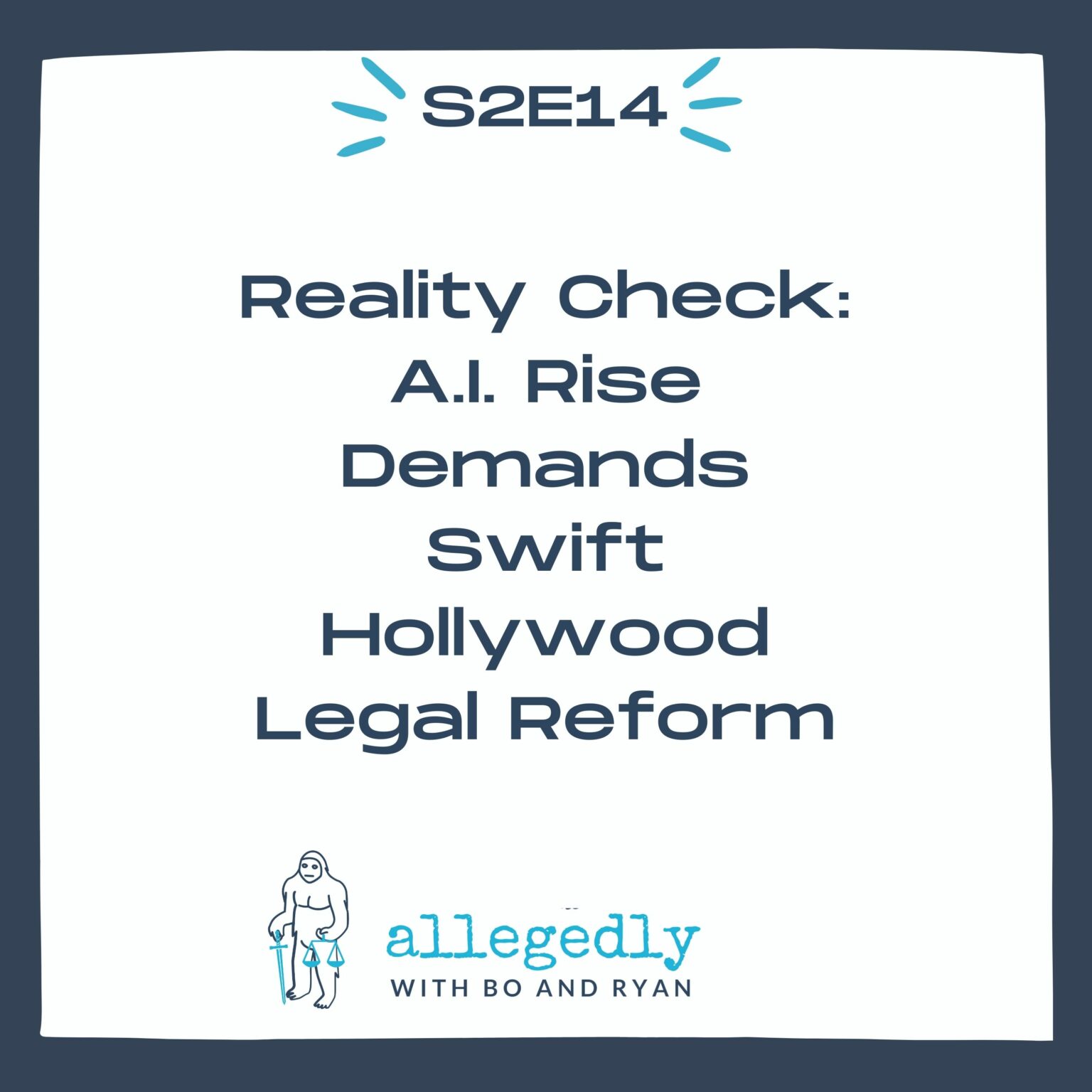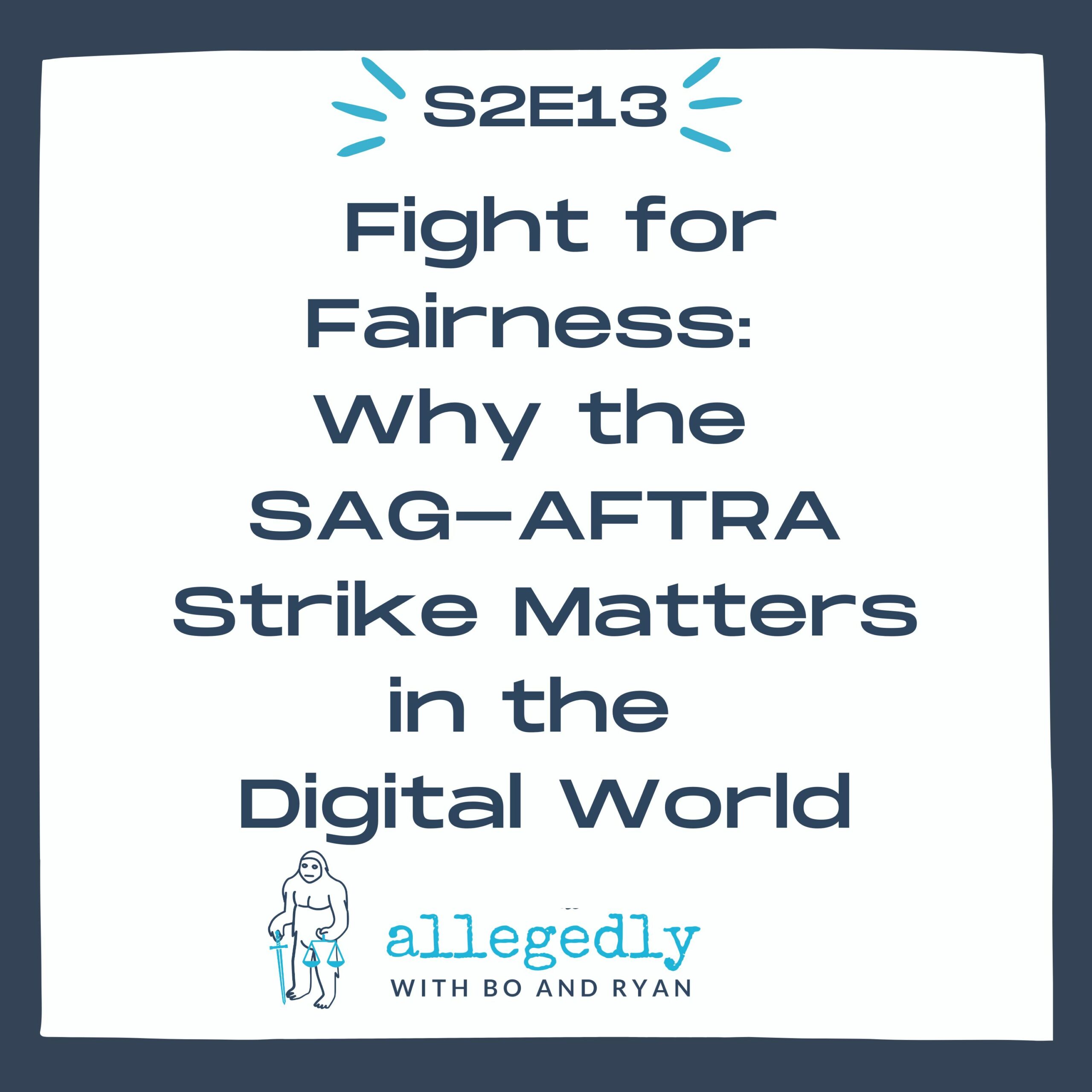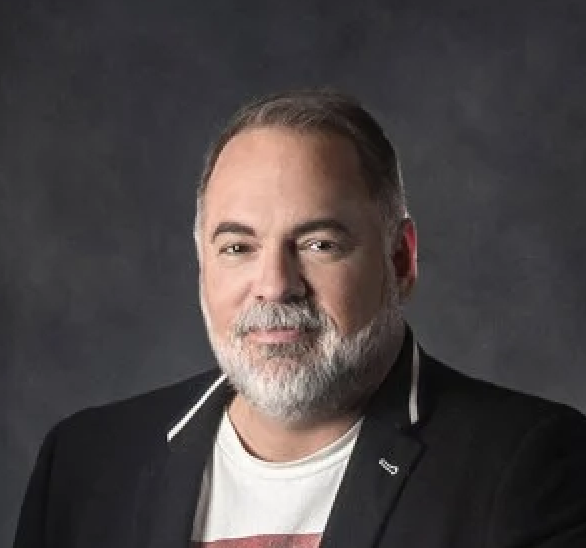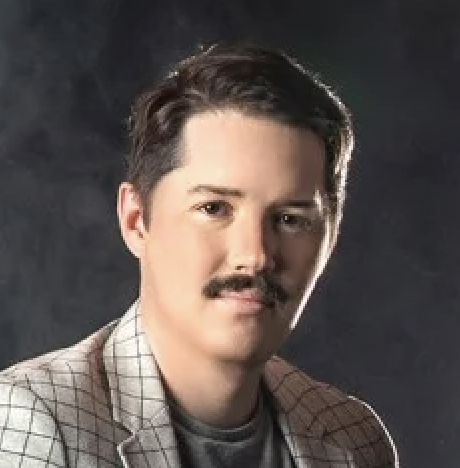allegedly with Bo and Ryan | Episode 8
On this week’s episode, Bo and Ryan discuss the ethical and legal issues with the MCU and finally answer the question we have all been waiting for: how (legally) accurate is She-Hulk: Attorney at Law? Tune in to find out!
Allegedly… with Bo and Ryan Podcast E8| Transcript
Bo: [00:00:00] Batman, kind of a dick. I mean, I know he has this famous policy of not killing people, but he definitely is not scared to break the law.
Ryan: [00:00:13] Welcome to Allegedly with Bo and Ryan, the only entertainment and law podcast that brings you the truth, the whole truth, and nothing but the truth. Allegedly.
Bo: [00:00:23] I’m Bo Bowen.
Ryan: [00:00:24] And I’m Ryan Schmidt.
Bo: [00:00:26] You’re listening to Allegedly with Bo and Ryan. We’re coming to you from our law offices in beautiful historic Savannah, Georgia, where we’ll be chatting about pop culture, hot legal topics in the news, and doing our best to change the way people think about the law and lawyers.
Ryan: [00:00:43] But first, a little about us. Bo is the world’s greatest outdoorsman. Once when he was hiking, he actually got bitten by a rattlesnake. After five excruciating days of pain, the snake finally died.
Bo: [00:00:54] And Ryan is famous for his love of new cars. But the moment Ryan drives a new car off the lot, its price doubles in value.
Ryan: [00:01:03] Together, we are Savannah’s consummate, renegade and legal titans.
Bo: [00:01:06] And the only corporate and entertainment lawyers in the free world who have never lost a single case.
Ryan: [00:01:14] Allegedly.
Bo: [00:01:15] Welcome to episode eight, Ryan. I’m guessing that’s about one episode for every award won by your famous mustache.
Ryan: [00:01:25] Or law firms that have disbanded instead of having to go up against the Bowen Law Group.
Bo: [00:01:30] Fair enough. Allegedly. So, you know, I thought it would be fun today. Ryan, to talk a little bit about the MCU. I know, you know, I’m a huge fan, but what’s your take on the MCU in general?
Ryan: [00:01:44] I am also a huge fan of the MCU, the Marvel Cinematic Universe. And but I’ve got to say, I’m a little burnt out a little bit by it, because when it was one movie a year, I was like, Yeah, I’m up for that. But it just seems like every week there’s another show, movie, you know, whatever. And if it’s since it’s all in the same timeline, if you miss one of them, you’re screwed.
Bo: [00:02:09] I have to admit that I also get a little confused by the talk of phases. We’re in phase seven of the MCU. I mean, what does that even mean?
Ryan: [00:02:20] Yeah, they have a predetermined amount of phases, and at the end of it, they’re like, okay, well, that was all the superheroes.
Bo: [00:02:26] Yes. So I get what you’re saying. But you’re right. I mean, one thing I have found pretty remarkable about the MCU, though, is, is the quality actually has–been some would say maybe not quite so much recently–but the quality over the length of time a number of movies has been remarkably high.
Ryan: [00:02:44] Oh, absolutely. I mean, each each movie you get, you get world class storytelling, the visuals, top talent. I mean, there’s a reason why they’ve been on top for so long.
Bo: [00:02:54] I mean, let’s face it, you compare it to the DC movies.
Ryan: [00:02:59] Yeah. Yeah.
Bo: [00:03:00] I mean, there’s been a few good DC movies, but overall you have to give a major advantage to the MCU.
Ryan: [00:03:07] Well, just even how intentional they are about all their movies. I mean, DC is notorious for trying to copy the MCU’s playbook. They’ll film a movie and they’ll have a script and everything, and in post they’ll just completely abandon whatever storyline that they were set out to make and try to recreate a comedy, you know, post hoc, and it’s always a disaster.
Bo: [00:03:32] That’s true. And, you know, it’s interesting how the MCU has now sort of expanded into television. And they tried that previously with some of those Netflix shows.
Ryan: [00:03:45] Or agents of S.H.I.E.L.D.
Bo: [00:03:46] Agents of S.H.I.E.L.D. Right. But certainly with the streaming wars and the shows that they’ve recently released on Disney+, I mean, the expansion of the MCU into television, you can’t say anything except that it’s a tremendous success of a thing.
Ryan: [00:04:03] Yeah. And and back to what we started talking about, about just the breadth of the Marvel Cinematic Universe. Since it is going on this timeline, it just continues. The story continues to develop. If I miss one, I feel like I have to go back, watch 40 movies in chronological order to find out why Peter Parker ate cereal on a monday.
Bo: [00:04:23] Fair enough. Well, I don’t know about Peter Parker eating cereal, but I’ll tell you what I did do this past weekend. I actually binge watched what I assume is probably one of your favorite shows of all time, “She-Hulk: Attorney at Law.” Oh, you know, a few episodes ago, we actually threatened, I think, to dedicate an entire show to the legal accuracies of “She-Hulk: Attorney at Law.”
Ryan: [00:04:51] Is that going to be this episode?
Bo: [00:04:52] It might be. Oh, I think we might have to talk about it a little bit, at least. You know, I did watch it, so. But first, I’m kind of curious, your thought, if we were to dive a little bit deeper than that. What do you think about talking about what the legal system would look like if superheroes were actually real?
Ryan: [00:05:14] That’s an interesting question for sure. I mean, and more important than people may think, you see superhero movies, and now these television shows, have really become one of the most dominant forms of entertainment. So they have a vast appeal and vast influence over global audiences. So, you know, it would be important to talk about just how accurate are they depicting society and legal challenges.
Bo: [00:05:42] Well, I mean, that’s a good point, because as much as I would love to try a case against She-Hulk, I think overall superheroes, particularly more recently, have really kind of blurred the line between what’s legal and illegal. I mean, yeah, of course, you know, Deadpool is one of my favorite movies, and it is certainly fun to watch him make wisecracks and kill all the bad guys. But, you know, in real life, you probably can’t go gunning down dozens of henchmen without consequences.
Ryan: [00:06:18] Fair enough. I mean, superhero movies do definitely tend to gloss over the legal issues, the ethical issues. But the need to operate outside traditional law enforcement, is kind of why they’re superheroes in the first place. I mean, think about it this way, no superhero in its origin story says, you know, the system is great, Justice always prevails. You know, just just hire a lawyer. Well, first of all, let me be a terribly boring comic book and then be like, Dude, you’re just like a referral service. You haven’t actually solved shit. But but think about that. Any single type of superhero starts from this origin story, whether they witnessed injustice, whether their family got mowed down by henchmen, whatever it is that the justice system has failed them, has failed them or the people that they want to protect. So in the beginning, the whole conceit of the superhero itself is that the legal system cannot be trusted to seek justice, to find justice. So they have to get that themselves, and they’re going to assume that role to bring justice to the world.
Bo: [00:07:30] No, that’s true.
Ryan: [00:07:31] I mean, otherwise every movie would end with the Joker or Thanos doing a perp walk with their hands cuffed behind their back by the NYPD.
Bo: [00:07:39] Well, you know, I mean, you’re probably right. Not as interesting a movie. So but, you know, who knew Allegedly with Bo and Ryan would suddenly turn into a deep philosophical debate regarding the ethics of superheroes?
Ryan: [00:07:55] You mean that old debate?
Bo: [00:07:57] Exactly. But before we we dive in any deeper into these ethical waters, I do want to start with She-Hulk. Now, like I said, I’ve just binge watched the whole series. You’ve seen at least a few episodes of. Yeah, of course. So I actually enjoyed the show, and I thought they did some things actually really right. I mean, they far more accurate, I would say that even some legal shows I’ve seen. So I do want to give them props for that and talk about that a little bit. But I will also say there were also a few things that they got pretty wrong.
Ryan: [00:08:31] Like the fact that lawyers don’t really turn into giant green monsters and tailored business suits that magically still fit when they triple in size.
Bo: [00:08:40] Oh, well, I mean, honestly, kind of sounds a little bit like me after a particularly gluttonous lunchtime trip to Bella Mushroom. So I’m not going to pick nits here. But let’s start by talking about some of the things that “She-Hulk: Attorney at Law” really got right about the law. And the first thing that came to mind as I was watching it, there’s there’s a case on the show in which Wong, the Sorcerer Supreme OK, he sues a guy named Donnie Blaze, I think. And he sues him for copyright infringement because Donny Blaze is using magic. Now, I don’t know if there’s a Donny Blaze in the comics, but in the show, he was a magician that studied under the masters of the mystic arts. But instead of going on to become like a hero, he uses the magic he learned to perform at the Magic Castle in Los Angeles and to do an act which is actually a real place by the way. I actually went there last time I was in LA. Very fun. But Donny Blaze wasn’t performing at that time. But nevertheless, Wong loses that case because the judge rules that magic cannot be copyrighted. So what do you think of that, Ryan?
Ryan: [00:09:59] Yeah, I mean, again, we’re getting into that whole idea of the “idea-expression dichotomy.” I mean, ideas, like magic tricks, are just not protected under US law. Copyright is only going to protect the expression of that idea. So you can copyright certain parts of a magic act like the script, or even if the choreography of particular way you perform a trick. That way other performers can’t completely rip you off and do your show word for word. But, you can’t just copyright magic tricks themselves. And, think about it this way: the magic trick, the illusion itself is an idea. You know, the way you perform it and the sleight of hand and the Vanna White and “ooh and ahh,” that is the expression. But the idea that you’re going to have this deck of cards and you’re going to flip your hands a certain way and do that, that is an idea, that is not a copyrightable expression. Now, the story you can tell the audience and the moves you do and the music, all of that can be copyrightable. But here, you know, the Sorcerer Supreme just didn’t know that. And so he’s just saying he copied he copied my stuff. But it actually, this actually happened in real life. You know, Penn and Teller actually won a copyright lawsuit against a Belgian magician that copied them on YouTube. But they won that because he had copied the way they perform the trick, not just because the trick itself.
Bo: [00:11:26] Got it. But I do have to back up and ask you about something. Did you say “the Vanna White?” Has, Pat Sajack, been a magician this whole time, and I just didn’t know?
Ryan: [00:11:36] Oh, yeah. You mean when the vowels go up on the screen? I mean, there’s nobody behind the curtains. He’s doing that with his mind.
Bo: [00:11:42] You heard it here first, ladies and gentlemen. Let me give you, Ryan, let me give you another example of a case in the show that I thought they did a particularly good job. Very realistic. There was a super hero named Leapfrog. Now, for those of you that didn’t see it, imagine a superhero named Leapfrog. And that’s probably exactly what he looks like. Had a big green frog suit. And what happens is Leapfrog has this suit custom made and then it kind of explodes and he gets injured. And so in the case, he hires She-Hulk to bring a products liability claim against the manufacturer of the super suit. Now, the show did actually a great job job explaining the different types of claims that can be made in a real world products liability case. I mean, they they talked about negligence. They talked about breach of warranty, strict liability, that type of thing. It was actually pretty impressive.
Ryan: [00:12:48] Yeah, absolutely. And talking about that Leapfrog case, remember when I picked Matt Murdock as one of the top three fictional lawyers back in episode three of Allegedly with Bo and Ryan? Well, Matt Murdock represents the manufacturer of the super suit against She-Hulk and kicks the crap out of her. I mean, looks like I made the right choice.
Bo: [00:13:09] That’s fair. I’ll give you that one.
Ryan: [00:13:12] And that episode shows a very realistic portrayal of what happens when a client withholds information from their lawyer. I’ll give you the example. So the Leapfrog suit was supposed to–it wasn’t supposed to explode–it was supposed to help the wearer of the suit and leapfrog jump higher, you know. And, during cross examination, Matt Murdock masterfully brings Leapfrog down this road, gives them just enough rope to hang himself. Come to find out this suit, the manufacturer says, you have to use the certain propellant in the suit to help give it the buoyancy in the lift. Well, Leapfrog doesn’t read the special disclaimers and warranties and how to use it. He’s like, I’ll put some rocket fuel in there. And that’s when he goes to jump, you know, the suit that’s made for a particular perfect purpose just explodes. So it’s a really good example of why you need to tell your lawyers everything. You know, She-hulk was completely caught off guard. This is this is news to her. She wouldn’t have filed this action if she thought that it was caused by her own client’s negligence, not the negligence of the manufacturer. So, if a client is not honest with their lawyer about everything, it can really screw up a case. I mean, that’s the whole reason why attorney client privilege exists. So you can tell your lawyer everything in your lawyer can be prepared for it. But if you’re if you get surprised like that, I mean, the game over. Last last thing you want to do is get surprised at trial.
Bo: [00:14:47] Yeah. Particularly from your own client withholding information. That is not a fun feeling. Exactly what happens to you. So I’ll also say I thought that She-Hulk did a really good job of portraying conflicts of interest and addressing that issue of conflicts of interest.
Ryan: [00:15:09] Very exciting stuff.
Bo: [00:15:11] Yeah, I know, but I’ve got to give them props where props are due do you know. There are several times throughout the series that She-Hulk expresses concerns about being able to represent a particular client because of a potential conflict. At one point they even have a villain named the Abomination sign a conflict waiver so that she can then turn around and represent him, which actually does happen in real life, although you rarely see it addressed in movies or television. But props for She-Hulk realistic portrayal of the thrilling world of conflicts of interest.
Ryan: [00:15:49] I feel like that might have been the MCU’s conceit in trying to make up for the fact that in Daredevil show, right, Daredevil will apprehend these henchmen and then represent them. Be their criminal defense attorneys.
Bo: [00:16:04] Yeah, that does raise some potential conflict issues that it did tend to just gloss over.
Ryan: [00:16:09] He’s like, I caught you. Now here’s my retainer.
Bo: [00:16:13] I like it.
Ryan: [00:16:14] So how about some of the things that She-Hulk gets are wrong? The first thing that jumped out at me was the personal litigation that She-Hulk and Titania had over the She-Hulk trademark. Titania claimed that she could own the trademark because she registered it first. But that’s not how it works. It’s about who uses a trademark first in commerce. And that’s important. In fact, you have to show that you’re using a mark in commerce before you can even apply for a trademark. And when we’re talking about federal trademark rights here, you have to show that you’re using it in interstate commerce.
Bo: [00:16:47] Right. Well, I mean, you’re absolutely right. They definitely fouled up that that litigation that was not on my list of things they did well. So She-Hulk in the show sues Titania because Titania is selling She-Hulk cosmetics. Guess what? Titania absolutely could have filed a legitimate trademark application, especially considering that when you apply for a trademark, it’s not just about the name or even who used it first, but it’s also the type of usage. You know, there’s only potential trademark infringement if consumers are likely to be confused by the different uses. That’s exactly why you can have Delta Faucets and Delta Airlines. You know, I mean, anyone with a brain is not likely to get confused or mixed up between a faucet and an airplane. In the same way, Titanium absolutely could have a beauty products trademark and She-Hulk could have a legal services trademark or summa superhero trademark. I’m sure those probably exist in the MCU, but those things are totally different. So they just got that completely wrong.
Ryan: [00:18:05] Right. I mean, you think about trademarks, the whole purpose of it, again, the government is giving you a monopoly on something for a certain period of time; for as long as you show that you’re actually using this in commerce. But it’s to identify the source of origin. It’s nothing else besides that. So if the consumers see that Titania is the one that’s selling these beauty products, then there is no customer confusion as to: Oh, did She-Hulk make these? No, She can have a completely different class. You know, her legal services, what however she wants to do it. But there’s dozens of classes that you can file trademarks in.
Bo: [00:18:41] Right. I think if they had had if Titania had put like a picture of She-Hulk on the on the bottle or something like that, then she would have had a claim.
Ryan: [00:18:50] Right. You, you would have a lot better evidence that she was trying to cause confusion because she was actually, you know, passing it off as she hoax goods and services. But I mean, just the whole trademark process in general, I think is pretty inaccurate in the show. She-Hulk files this trademark action. It was basically in court the very next day. You know, we talk about the fact that legal matters aren’t nearly as quick as they were portrayed on television. You know, not how it works at all. Legal cases in general take a very long time. They’re very slow moving. And that’s even before you had these COVID shut down courts for about a year and a half and we’re working through that backlog. But even before that, you file something, you’re not going to get on the docket for a year or two, not the next week. And these involve extremely complicated legal filings that can take years to get in front of a court. You know, think about think about it this way. If it was that easy to get in front of a court, you know, the very next week, then there would be absolutely no cases being filed.
Bo: [00:19:59] Yeah, it’s fair enough. You know, so well, overall, I feel like they did some things right. They did some things wrong. Overall, I would say it goes to prove my theory. Take legal advice from lawyers and not television shows. Especially if the lawyer on the television show was wearing a cape and tights. So that might be a little bit removed from reality.
Ryan: [00:20:27] You know, there’s another Marvel show that you and I talked about a lot here in the office, and that’s Wandavision.
Bo: [00:20:32] Oh, yeah, Loved Wandavision.
Ryan: [00:20:33] I think both of us were bothered by the fact that Wanda basically took every citizen of the entire town of Westview, New Jersey, hostage, apparently for months, and at the end of the show basically said, “my bad” and walks away without any consequences. I mean, what do you think would happened in real life?
Bo: [00:20:50] Well, I guess my first question would be is what could have happened? Because, I mean, they made it pretty clear that Wanda, who I guess by the end was the Scarlet Witch, was one of the most powerful beings in the universe. So who’s going to arrest her?
Ryan: [00:21:08] Fair enough. Fair enough. But if they could like. So she had broken the law, right?
Bo: [00:21:13] I mean, I don’t know about I mean, kidnapping is actually a close question because there are several very kind of technical things you have to prove in a kidnapping case. But in terms of, I think wrongful imprisonment, which is also a criminal charge, that would have been a slam dunk. I mean, that’s any time you restrain someone else and take away their liberty and freedom. That is 100% what Wanda did in that show to the entire town. She uses her mind control on every single citizen of Westview and holds them against their will. I mean, that’s that’s absolutely wrongful imprisonment or criminal restraint, as it’s called in some places.
Ryan: [00:21:55] So in real life, she would probably not only get arrested, but she would also certainly face some civil penalties as well. I have to believe that there would be a class action lawsuit filed against her and the citizens of Westview, and that’s probably why she’s hanging out in the mountains at the end of the show. She’s evading service.
Bo: [00:22:12] Yeah. Yeah. I mean, maybe they could get Matt Murdock to represent them.
Ryan: [00:22:17] Oh, yeah, He would crush it.
Bo: [00:22:19] So, yeah, you’re right. They definitely would be civil penalties. And if I’m a citizen of Westview, I’m joining in that class action.
Ryan: [00:22:25] Oh, for sure. Well, going back to our earlier discussion, as silly as these shows can be, this is going to actually be an important question. These shows don’t exist in a vacuum, right? They are so popular and pervasive that they can actually influence people. I mean, just look at the example of Law and Order. “Last Week, Tonight” with John Oliver recently did a show about the impact of “Law and Order” and how it has an effects people’s beliefs about the criminal justice system. And almost all of those beliefs held by fans are 100% wrong.
Bo: [00:22:59] You’re right. I saw that episode he talked about, like he gave an example of like people that are fans of “Law and Order” believe that sexual assault cases are solved and closed by the police like 95% of the time, because that’s what it is on the show. In real life, it’s more like 3% of the time. So, I mean, but, you know, I can give you another perfect example. Remember the show “24?” Of course. Well, several times in that show, it showed Jack Bauer, the hero, torturing people to get information from them as as the clock is ticking. You know, afterwards, studies showed that people that watch the show were far more likely to believe that torture was a reliable and effective way to get information, which it absolutely is not. And in fact, this blew my mind. I remember watching Justice Antonin Scalia, from the US Supreme Court. He actually gave a speech. This was back when all that talk was going on about torture in the Iraq war and everything, and Bush was getting a lot of crap about torture. And Scalia actually brought up in a speech the show 24 …
Ryan: [00:24:19] no.
Bo: [00:24:20] … In defending torture. And he was like, look, all you have to do is watch 24 and see how Jack Bauer is able to get information from people. I mean, are you telling me that we should prosecute Jack Bauer? I’m like, What is happening here?
Ryan: [00:24:36] Yeah, I just call the executives of Fox Network.
Bo: [00:24:39] I mean, it absolutely is the case that the that any show, particularly a very popular show that that goes out to, it’s watched by a lot of people, it absolutely can influence thinking.
Ryan: [00:24:54] I honestly think this can be an issue in the superhero shows and the movies that we’re talking about. I mean, superheroes definitely straddle the line between the the legal and the illegal. And think about how it’s always the superheroes who personally decide and achieve justice, not the law. They aren’t bound by any legal procedures. And if they were, Matt Murdock would never even have to be Daredevil.
Bo: [00:25:17] Yeah, he could just use his superpower of being an amazing lawyer all the time. But, you know, even the fact they have superpowers, regular humans, even law enforcement officers, they’re not going to be able to force them to do anything they don’t want to do. I got to say, Ryan, you are really making me think as we sit here about the implications of the way superheroes are not just presented but actually glorified, you know, almost deified on the screen. Superman might be not might not be the best example. Superman is typically–I know there’s some difference lately in the comics– but typically, Superman is portrayed as a very good, nice moral character. A lot of times he’s even called the big Boy Scout and in the comics themselves. But let’s talk about Batman. On the other hand, you know, Batman kind of a dick. I mean, I know he has this famous policy of not killing people, but he definitely is not scared to break the law. I mean, let’s talk about illegal surveillance constantly. And he definitely uses excessive force, I mean, legitimately to the point of actual torture. So in reality, if this were real life, he would absolutely be just as much of a criminal as the people he’s fighting. Yet you’re in the movies, you can’t help it. You’re pulling for him, right? Yep. You know, I mean, it definitely sends a message that you can ignore the law if you believe you’re doing the right thing, or at least if you believe that the existing law is not sufficient or effective and that you need to ignore it in order to achieve your goals.
Ryan: [00:27:13] You’re actually getting to the whole point. I think that superheroes were created in the first place. I mean, Superman, Batman, Wonder Woman, even Captain America were all created either in the lead up to or during World War Two to help ease people’s anxieties.
Bo: [00:27:29] I mean, they actually showed them fighting Nazis.
Ryan: [00:27:31] Exactly. I mean, it was clear what they were trying to do. They’re saying these are your heroes and they’re going to fight for you.
Bo: [00:27:38] And protect you and keep you safe.
Ryan: [00:27:40] Exactly. So then then that that trend is continues throughout the evolution of superheroes. Think about Fantastic Four, Thor, Hulk, Iron Man, all created during the communist threat and had many issues that were really actually fighting communists.
Bo: [00:27:57] Yeah, you’re right. And, you know, I mean, I think it’s interesting and you do have to give them some credit because comics, movies, the television shows, I think they do try and they do a pretty good job of showing that superheroes sometimes can make bad decisions, or at least there’s there can be terrible unintended consequences for their actions in the end. You know, I mean, like, that was the whole reason of the for the what was the Sokovia Accords, Right? They destroyed an entire town. It certainly was not intentional, but that’s what happened. But even with those attempts in the end, just by the very nature and definition of the superhero genre, there’s going to be a good guy and a bad guy, you know? I mean, that’s just, that’s just it. And, in real life, though, that’s just not the case. I mean, the world that we live in, it’s a lot more complex than that. I mean, good and evil, right and wrong. That’s great in theory, but that’s not always clearly black and white.
Ryan: [00:29:07] Right. And if it was we, we’d actually be out of jobs. Right? If there was like one clear winner, who would ever defend that?
Bo: [00:29:15] Yeah, fair enough.
Ryan: [00:29:16] So I would challenge our listeners to count how many times the hero actually breaks the law. The next time you watch a superhero movie. When you watch it, just keep in mind, you may find that superheroes deserve to be in jail more than the villain.
Bo: [00:29:29] Oh, damn right. You are taking a lot of fun out of watching some of my favorite movies. I mean, how am I even going to watch Deadpool kill 100 people with ten bullets without thinking about your lecture here? How dare you? What next Are you going to tell me? That Hulk smashing all of New York and Professor X mind wiping people willy nilly is somehow wrong?
Ryan: [00:29:52] You mean, kind of like how opponents quickly learn how wrong it is to oppose the Bowen Law Group?
Bo: [00:29:58] Exactly, Ryan. Which is why, of course, we’re the most successful lawyers in the history of the world … allegedly.
Ryan: [00:30:05] Well, that’s our show for today. Thanks for listening to the legal mastery of the highly intelligent and easily most attractive true legal outlawyers in Savannah. And remember, the only lawyers in the free world that have never lost a single case…
Bo: [00:30:17] Allegedly.
Ryan: [00:30:18] To continue to receive free edge of your seat legal anecdotes, mind blowing takes on hot legal topics, and a general, master class and awesomeness, please head over to bowenschmidt.com/podcast and look for …
Bo: [00:30:30] Dude, you’re killing me. You know, like Deadpool. Just hit the subscribe button.














